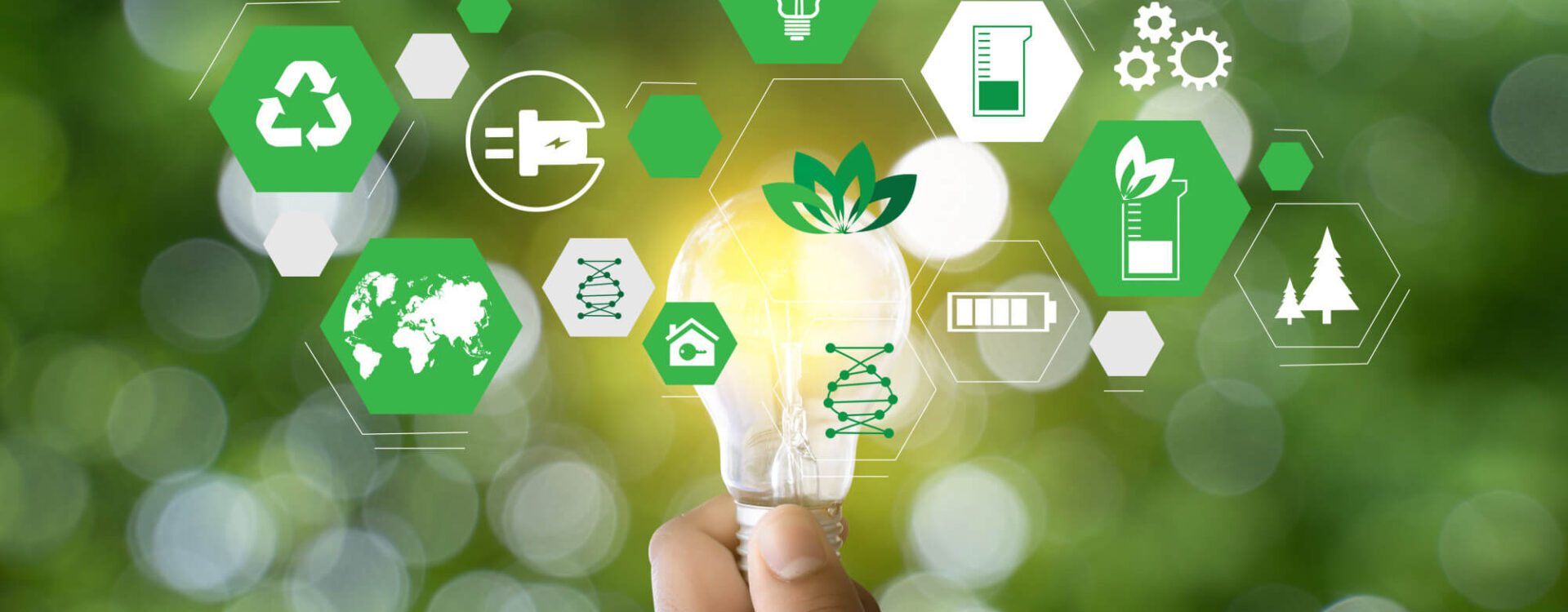The 5 Rs of sustainability represent the sequence of actions that can be taken to promote sustainability: Reduce, Reuse, Recycle, Rethink and Refuse. The proposal is that, by following this sequence, it is possible to promote a change in behavior that leads to more sustainable and conscious daily practices, contributing to the preservation of the environment and to the construction of a more balanced and healthy future. This policy is based on the idea that it is possible to reduce the consumption of natural resources and generate less waste through changes in individual and collective behavior.
The 5Rs policy has its roots in the circular economy, which is based on the principle that natural resources are finite and must be used more efficiently and sustainably. Thus, by promoting reduction, reuse and recycling practices, the circular economy seeks to minimize the extraction of new resources and reduce the environmental impact of our activities.
This practice has been increasingly adopted by governments, companies and individuals around the world as a way to promote sustainability and environmental preservation. In addition, the 5 Rs policy has proven effective in reducing costs and increasing efficiency in several sectors, including industry and commerce.
The importance of these principles can be summarized in three main points:
- First: the adoption of the 5 Rs contributes to the preservation of natural resources, such as water, energy, raw materials and biodiversity. Reduce, reuse and recycle practices allow these resources to be used more efficiently and sustainably, reducing extraction and waste.
- Second: the 5 Rs allow us to reduce the environmental impact of our daily activities, reducing the generation of waste, the emission of greenhouse gases and the consumption of natural resources, which is essential to mitigate the effects of climate change and preserve the biodiversity.
- Third: the 5 Rs contribute to the promotion of a culture of sustainability, which values the preservation of the environment and the construction of a more balanced and fair future for all. By adopting more sustainable practices in our daily lives, we contribute to promoting a change in individual and collective behavior in relation to the environment, building a more sustainable and conscious society.
Adopting Sustainable Everyday Practices
Adopting sustainable practices in our daily lives is essential for preserving the environment and building a more balanced and healthy future. Small changes in our habits can make a big difference for the planet, which is why it is important to know practical tips to reduce energy, water, paper and plastic consumption at home. These simple practices can help conserve natural resources, reduce the environmental impact of our everyday activities, and promote a culture of sustainability in our society.
Tips to reduce energy consumption at home:
- Replace incandescent bulbs with LED bulbs, which consume less energy and last longer;
- Turn off electronic devices from the socket when not in use, as they consume energy even in mode standby;
- Set the air conditioning to a higher temperature in summer and lower in winter and use curtains and blinds to control sunlight.
- Use energy-efficient appliances rated A or better.
- Install solar panels on your home to generate clean, renewable energy.
How to reduce water usage:
- Take shorter showers and keep the shower closed while soaping your body;
- Use washing machines and dishwashers only when they reach maximum capacity, avoiding excessive and unnecessary use;
- Immediately repair faulty faucets, leaks or discharges;
- Reuse rainwater to water plants and clean external areas;
- Use drip irrigation systems instead of hoses or sprinklers to water the garden.
Reduced paper consumption:
- Store documents on some digital platform, avoiding printing unless strictly necessary;
- Print using both sides of the sheet and activate the ink saving mode to reduce consumption of both ink and paper;
- Use recycled paper and choose products with the FSC (Forest Stewardship Council) seal to ensure that the paper comes from sustainable sources.
How to reduce plastic use:
- Take reusable bags when you go shopping instead of using disposable plastic bags;
- Choose products with recyclable or reusable packaging;
- Use reusable water bottles instead of disposable plastic bottles;
- Avoid products that contain microplastics, such as cosmetics and cleaning products, and give preference to more sustainable alternatives.
Rethinking Responsible Consumption
Rethinking is the beginning of the change in the practices we adopt in relation to the environment. When we understand that we need to start in ourselves the transformation that the planet needs, we also understand the importance of incorporating the practices of the Rs to achieve a more sustainable routine.
Rethinking can involve changes in different aspects of life, such as food consumption, transportation, energy use, waste management, among others. For example, rethinking food consumption can lead to healthier and more sustainable choices, such as opting for organic food, locally produced and without the use of pesticides.
Rethinking can also mean questioning the need for certain products and services, avoiding unnecessary consumption and reducing the amount of waste generated. It can also involve using more efficient and sustainable technologies, such as renewable energy sources and public transport.
This is an important practice to promote positive changes in our habits and behavior, contributing to the preservation of the environment and to the construction of a more sustainable and balanced society, especially when followed by the other practices that are part of the Rs.
Reduce
Reducing is one of the practices of the 5 Rs of sustainability and consists of reducing the amount of natural and material resources we consume in our daily lives. The idea is to avoid waste and excessive consumption, thus reducing the environmental impact of our daily activities.
The practice of reducing can be applied in various aspects of life, such as the consumption of water, energy, food, cleaning products, among others. Some of the main measures to reduce consumption include:
- Use more efficient equipment and appliances in terms of energy consumption, such as LED lamps and appliances with the Procel energy efficiency seal;
- Reduce bath time and turn off the faucet while brushing your teeth or washing your hands;
- Avoid the use of disposable plastic bags and opt for returnable bags or shopping carts;
- Consume food consciously, avoiding waste and opting for organic and locally produced products;
- Use biodegradable cleaning products and avoid using disposable products such as plastic cups and paper towels.
reuse
Reusing is another one of the practices of the 5 Rs of sustainability and proposes that products and objects that have already been used be given new functions and useful life, preventing them from being discarded early and becoming waste. Reuse is important because it reduces the amount of waste generated, reducing the extraction of raw materials and saving energy and natural resources that would be needed to produce new products.
There are many ways to reuse products at home, from repurposing objects that would otherwise be discarded to transforming them into something completely different. Some examples of tips for reusing objects at home include turning cardboard boxes into drawer organizers, using glass jars to store food, or creating plant pots from cut-up plastic bottles. It is also possible to give packaging and containers a new use in different ways, such as reusing plastic bags to transport purchases or reusing PET bottles as containers to store water and cleaning products.
The reuse of products and objects is a simple and efficient practice that can be implemented in our daily lives, contributing to the preservation of the environment and the construction of a more sustainable and balanced future.
Recycle
Recycling is also one of the practices of the 5 Rs of sustainability and is based on transforming materials that would otherwise be discarded into new products, thus avoiding the extraction of new natural resources and reducing the environmental impact of improper waste disposal, and can be applied to various materials. , such as paper, plastic, glass, metal, among others.
For recycling to be effective, it is important that materials are correctly separated and sent to the proper destination, either through selective collection or through specific recycling programs.
By recycling materials, we reduce the amount of waste that is sent to landfills and dumps, thus reducing soil and water pollution. Recycling contributes to saving energy and natural resources, as the production of new products from recycled materials consumes less energy than production from virgin raw materials.
Refuse
Finally, refusing is the last of the practices of the 5 Rs of sustainability and is based on avoiding the consumption of products that are not essential or that generate a great environmental impact throughout their life cycle, from the extraction of the raw material until its disposal. By refusing products, we avoid the excessive production of waste and the unnecessary extraction of natural resources, contributing to the preservation of the environment, and by opting for products that are more sustainable, we encourage industry to innovate and develop more sustainable alternatives. By increasing the demand for more sustainable products and rejecting those that are harmful to the environment, we are encouraging the industry to invest in more responsible and innovative solutions, which can lead to significant advances in terms of sustainability.
Some ways to refuse products are: avoid using disposables, such as plastic cups and cutlery; always choose products with more sustainable packaging or reusable packaging; opt for organic and more sustainably produced products; and choose brands or companies that are committed to sustainability and social responsibility.
By adopting the practice of refusing products, we are contributing to a more conscious and responsible society in relation to the environment, as well as to building a more sustainable and balanced future.
Adopting the 5 Rs of sustainability in our routine is essential for preserving the environment and building a fairer and more balanced future. The practices of reducing, reusing, recycling, rethinking and rejecting can have a great positive impact on the planet, as each of us has the power to make a difference and contribute to a more sustainable and conscious world. Our attitudes can generate significant changes for present and future generations. It is important to remember that the responsibility belongs to all of us and that each one must contribute to a more balanced and conscious world.




